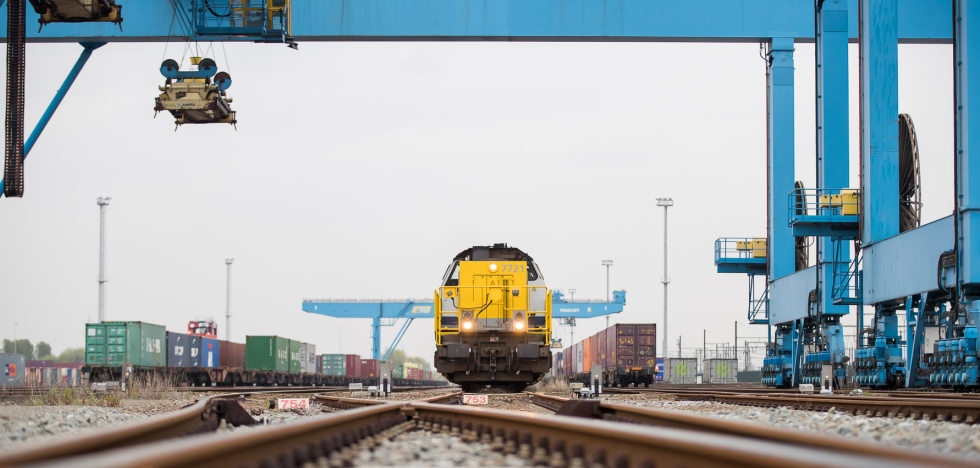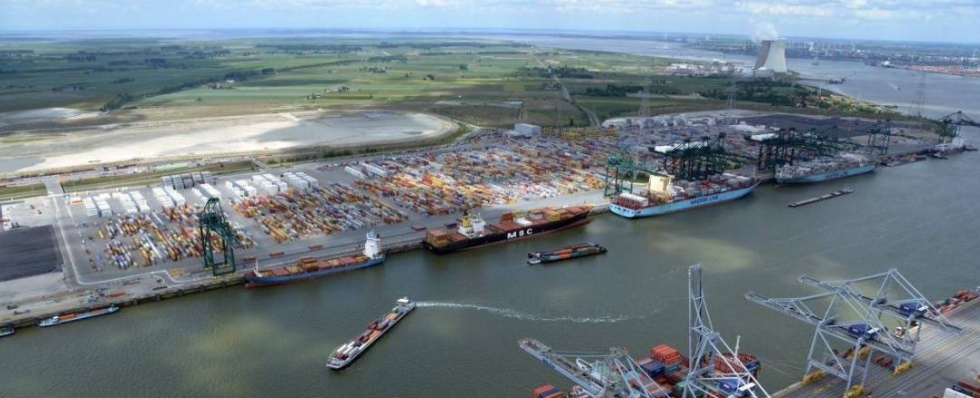|
|
|

Port of Antwerp Expands Use of Rail Shuttles to Surrounding Areas
June 24, 2020 - The Port of Antwerp announced railway operators are offering extra train connections between Antwerp and the hinterland due to low water levels on the Rhine, which continue to cause problems for inland waterway transporters.
According to the Port, this year the low water levels will again impact the capacity of inland waterway transport between the Port of Antwerp and the hinterland. The roadworks on the Oosterweel connection will also create issues for road transport. It is more vital than ever to use the various transport alternatives.
Various railway operators are expanding capacity in relation to their connections or introducing new shuttles. This, in turn, supports intermodal connectivity from the Port of Antwerp. In the first 6 months of 2020, this concerns the railway capacity to Poland, Germany, Switzerland, Austria, Slovakia and Czech Republic.
- New shuttle with Poland to destinations, Kutno, Brzeg Dolny, Gliwice, Kolbuszowa by operator PCC Intermodal, 3 x per week direct connection, terminals in Antwerp: MPET, AG, PSA, Main hub
- Expansion of railway capacity in Germany on shuttles Mannheim, Recklinghausen, Stuttgart, Karlsruhe, operator Lineas Intermodal, 3 x per week, terminals: MPET, AG, PSA, Main hub
- Expansion of capacity at Duisburg by Kombiverkehr, 3 x week, terminal: Combinant
- Improved shuttle with Switzerland at destination Frenkendorf via Neuss, operator Swiss Terminal, 3 x per week, terminals in Antwerp: MPET, AG
- Increased frequency of shuttle Basel Switzerland from 5 to 8 per week, operator Lineas Intermodal, terminals: MPET, AG, PSA, Main hub
- Increased frequency of shuttle with Austria at Vienna, from 3 to 6 per week, operator Lineas Intermodal, terminals: MPET, AG, PSA, Main hub
- Increased frequency of shuttle Slovakia at Bratislava from 3 to 6 per week, operator Lineas Intermodal, terminals: MPET, AG, PSA, Main hub
- Increased frequency of shuttle Czech Republic via Recklinghausen from 3 to 5 per week, operator Lineas Intermodal, terminals: MPET, AG, PSA, Main hub
- New shuttle with France at Metz via existing shuttle Athus (Antwerp-Athus-Metz) 2 x per week, operator Luxport, terminals Antwerp: MPET, AG, PSA
Various railway operators are also planning new shuttles or expansions to the capacity of their railway connections between Antwerp and European countries (e.g. MSC Medlog, Lineas Intermodal, Hupac and others) in the spring, the Port said.
In addition, railway connections from the Port of Antwerp with China are also gaining ground.
SOURCE: Port of Antwerp |
|
Former FMC Commissioner Bill Doyle Named Executive Director of Maryland Port Administration
 June 16, 2020 - Maryland Port Administration (MPA) announced that William P. Doyle, a former United States Federal Maritime Commissioner, will lead the Port of Baltimore as the new Executive Director of the Maryland Port Administration, effective July 22. June 16, 2020 - Maryland Port Administration (MPA) announced that William P. Doyle, a former United States Federal Maritime Commissioner, will lead the Port of Baltimore as the new Executive Director of the Maryland Port Administration, effective July 22.
Doyle is a respected maritime professional with nearly three decades of experience in the transportation and energy sectors. As a former U.S. Maritime Commissioner from 2013-2018, Doyle represented the United States in numerous global negotiations and facilitated positive outcomes to disputes among maritime industry and labor groups. In his role, he aided U.S. Labor and Commerce Secretaries in major labor negotiations and co-chaired maritime trade discussions with the People's Republic of China, European Union Trade Commission, Panama and Greece. Doyle most recently served as the Chief Executive Officer and Executive Director of the Dredging Contractors of America.
“With a distinguished career in the maritime industry and international trade spanning nearly three decades, I am confident that Bill Doyle will lead the Port of Baltimore in driving Maryland’s economy forward,” said Maryland Governor Larry Hogan. “Under his leadership, the Port of Baltimore will continue to create jobs and keep the supply chain moving as it has throughout the COVID-19 pandemic."
Doyle graduated with a bachelor’s degree in marine engineering from Massachusetts Maritime Academy and is a U.S. Coast Guard Licensed Marine Engineer. He also has a law degree from Widener University Commonwealth Law School in Harrisburg, Pennsylvania, and is a graduate of Georgetown University Law Center’s program at the Academy of WTO Law & Policy Institute of International Economic Law.
SOURCE: Maryland Port Administration |
|

Over 100 Import-Export Companies Support the Development of Port of Québec's Laurentia Container Terminal
June 15, 2020 - More than one hundred companies have given their support to the development of Laurentia, the Port of Québec's deep-water container terminal project, which will create a new economical supply chain for Quebec and Eastern Canadian importers and exporters, enabling them to gain efficient access to international markets in Asia and Europe.
The Quebec Container Terminal, operated by Hutchison Port Holdings (HPH) and Canadian National (CN), will open in early 2024 and will provide shippers with improved access to traditional markets in Europe and the Mediterranean as well expanding markets in Southeast Asia.
In addition to becoming the most ecological and technologically advanced facility in North America, the terminal will offer import-export companies faster transportation times and more competitive rates than those currently offered by other ports on the east coast of the United States operating in the deep-water seaport and large container ship markets.
HPH, the world's leading port investor, developer and operator with a network of 52 ports spanning 27 countries, and CN, an established transportation network providing access to the heart of North American industry, are making a stake, together with the Port of Québec, on Québec City becoming a new intermodal and transportation hub through the establishment of an essential supply chain. The port location and the Quebec Container Terminal offer critical responses to changing trends taking place in today’s shipping industry.
Karen Roach, Vice-President Pulp & Paper Business Optimization for Resolute Forest Products, said, "Resolute's long-term export requirements are based on a modern and cost efficient supply chain. International markets are very competitive, and the Quebec City Big Ship Container Port will provide exporters as well as consumers access to bigger ships and trains, providing important efficiencies."
The Laurentia Project includes a wharf with a 16-metre water depth, capacity to accommodate 13,000 TEU container ships and a direct connection to a high-performance rail transportation network that can reach one hundred million North American consumers.
SOURCE: Port of Québec |
|

JAXPORT Welcomes Acting US Secretary of Homeland Security Chad Wolf
June 3, 2020 (Press Release) - Leadership from JAXPORT, U.S. Customs and Border Protection – Area Port of Jacksonville, and U.S. Coast Guard Sector Jacksonville joined U.S. Congressman John Rutherford in welcoming Acting Secretary of Homeland Security Chad F. Wolf to JAXPORT [last week].
The visit included an update on JAXPORT’s major growth projects, including the Harbor Deepening Project which remains two years ahead of its original schedule due in large part to support from the federal government, and a briefing on how the port has continued to safely operate and remain open for business during COVID-19.
“Getting the economy opened back up safely is a top priority for Homeland Security and JAXPORT really personifies that. Jacksonville’s port has remained open throughout the pandemic and plays an important role in our country’s economic recovery and national security.”
— Acting Secretary of Homeland Security Chad F. Wolf.
“Getting the economy opened back up safely is a top priority for Homeland Security and JAXPORT really personifies that,” said Secretary Wolf. “Jacksonville’s port has remained open throughout the pandemic and plays an important role in our country’s economic recovery and national security.”
“We are grateful for the continued support of our federal partners as we work to keep cargo moving and people working,” said JAXPORT CEO Eric Green. “When the economy picks back up, our strategic location and diversification of business puts us in a very favorable position to grow our cargo volumes and their economic impact for Northeast Florida.”
Cargo activity through Jacksonville’s seaport generates 138,000 jobs in Florida and $31 billion in economic output for the region and state. As one of the nation’s 17 Strategic Seaports, JAXPORT is on-call 24/7 to move U.S. Military cargo for national defense, disaster relief and foreign humanitarian aid, and is the only port in Florida with this designation.
About JAXPORT
JAXPORT is an international trade seaport offering direct ocean carrier services to 140 ports in 70 countries. The port offers fast access to 70 million U.S. consumers via 100 trucking firms, three major interstates, and 40 daily trains. For further information, visit: www.jaxport.com
SOURCE: JAXPORT |
|

Alfaport-Voka, Antwerp Port Authority and Maatschappij Linkerscheldeoever Agree to Extend Payment Period for Concessions
June 3, 2020 - In order to support the Port of Antwerp concession-holders in the present exceptional circumstances, Antwerp Port Authority and Maatschappij Linkerscheldeoever (MLSO) have agreed to grant an extension of the payment period for domain concession fees.
In response to the Covid-19 crisis the members of the Antwerp port community asked the Port Authority and MLSO for support measures. After consultation with Alfaport, the Port Authority and MLSO have decided to extend the deadline for payment of concession fees until 30 July 2020, for invoices relating to Q3 2020. In practical terms, for the quarterly invoices this means:
Invoices Dated 15 June 2020 – Payment Deadline: 30 July 2020
The Port Authority and MLSO may exceptionally switch to monthly invoices for Q3 2020, on the basis of a specific request by the concession-holder, with reasons being given. This request must be submitted for concessions of the Port Authority at the latest by 10 June 2020 to [email protected]. In this exceptional case the following dates apply:
- invoices dated 15 June 2020 – payment deadline: 30 July 2020
- invoices dated 15 July 2020 – payment deadline: 31 August 2020
- invoices dated 14 August 2020 – payment deadline: 30 September 2020
Antwerp Port Authority, MLSO and Alfaport-Voka will monitor the situation closely in the meantime.
Source: Port of Antwerp |
|
|
|
|
<< first < Prev 21 22 23 24 25 26 27 28 29 30 Next > last >>
|
|
Page 24 of 31 |